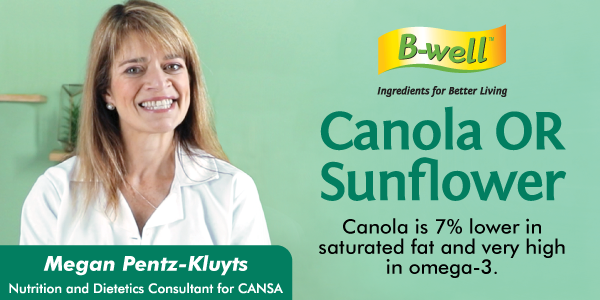Walking down the supermarket aisle and seeing the rows of shelves packed with different kinds of cooking oils, can make for a daunting task in how to choose the oils that help better support you and your family’s health. Diet has become one of the most important risk factors to reduce the global burden of noncommunicable chronic diseases. The South African guidelines for healthy eating advise, ‘Use fats sparingly: choose vegetable oils rather than hard fats,’ this both addresses the balance between amount we eat, where just like with everything – ‘moderation is key’ and the quality, referring to vegetable oils, including oils such as canola seed oils, olive oils versus hard fats, like palm kernel and coconut oils. Not only do cooking oils offer an appealing mouth feel, adding taste and satiety to any meal, but they are calorie-dense and help with the absorption of our fat-soluble vitamins.
Not all oils are created Equal
Cooking oils are no longer seen merely as an important source of energy, but instead as an essential component of the human diet. Each type of oil has a different mix of saturated, monounsaturated, and polyunsaturated fatty acids that can help to promote better health. Today, we know replacing saturated fats with unsaturated fats can improve health and we need both polyunsaturated, our source of essential Omega-6 and Omega-3 fatty acids as well as monounsaturated fats in our diets.
Western Diet
Our westernized dietary patterns tend to be high in more inflammatory Omega-6 fats, including omega-6 rich cooking oils such as sunflower and grapeseed oils are among the highest in omega-6 fatty acids and a poor intake of Omega-3 food sources, such as whole grains, Canola and flaxseed oils, vegetables, and marine food.
Canola oil shines
In 2015, the US Food and Drug Administration authorised Canola oil was with a qualified health claim owing to its plant-based omega-3 content, and its positive effect on total cholesterol and low-density lipoprotein (LDL) cholesterol, indicators of heart disease.
Make the Switch
In 2016, the South African Journal of Clinical Nutrition reported in a study that the most favourable ratio of omega-6 to omega-3 was found in Canola oil. This affordable oil with an appreciable omega-3 fatty acid content, can contribute significantly to omega-3 fatty acid intake in South Africans. In 2020, a study in the South African Medical Journal confirmed that plant-based Omega-3 fatty acids, found in oils like Canola may have a protective role against developing heart disease. Research also shown that plant Omega-3, found in oils like Canola oil, is more anti-inflammatory and has other heart-healthy properties, like thinning the blood.
Smart Choice
Canola oil is a cooking oil high in Omega-3 and has only 7% saturated fat making it a good choice to help increase the overall Omega-3 intake in our Western diet. Omega-3 has a more anti-inflammatory effect and may help reduce the risk of certain cancers. B-well Canola seed oil is a non-GMO, local oil. The CANSA Seal of Recognition Programme partnered with B-well Canola seed oil and is high in essential Omega-3 fatty acids, to help lower the risk of certain cancers, as part of a balanced diet.

